World
Henry Kissinger: The Misjudged Idealist?
Jaideep A Prabhu
Jan 24, 2016, 08:25 PM | Updated Feb 19, 2016, 04:10 PM IST
Save & read from anywhere!
Bookmark stories for easy access on any device or the Swarajya app.
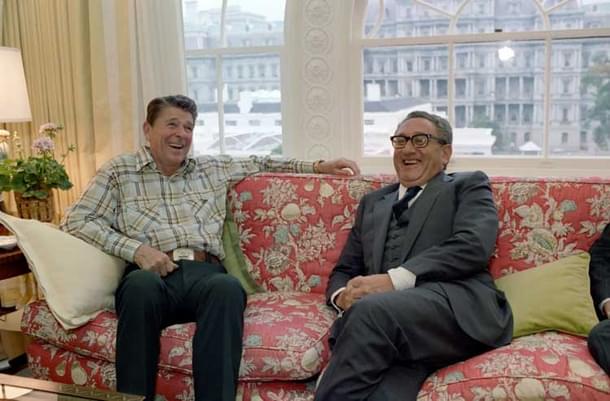
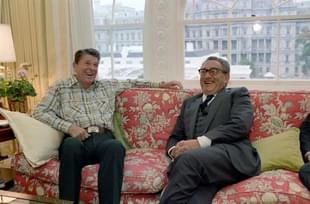
So how should one view the legacy of Henry Alfred Kissinger? Was he a calculated and ruthless arch-realist aimed at winning the Cold-War for the USA or was he really a progressive idealist trying to make the world a better place?
Niall Fergusson attempts to answer these questions in his book.
Le uova non hanno ballare affari con pietre – Sicilian proverb
There are three things going for Kissinger, 1923-1968: The Idealist (henceforth The Idealist). The first is that the author, Niall Ferguson, has a felicity with words that is rare among academics. As anyone who has read the two-volume The House of Rothschild or The Cash Nexus can attest, Ferguson survived the systematic excoriation in graduate school that transforms the Queen’s English into dense, jargon-laden, and self-absorbed prose. The Idealist, for all its impressive archival and primary source research, remains a book for the general public and is not an impenetrable tract that only a few specialists will relish.
This leads to the second thing, that it is a biography – that too an authorised one – of “the most revered and reviled man” in international politics since Napoleon Bonaparte, Henry Kissinger. It is bound to attract more than the average Kissingerologist, be he an academic, journalist, activist, or quack. The third reason is, of course, the highly provocative assertion in the subtitle that Kissinger, universally seen as a ruthless and amoral arch-realist, the 20th century incarnation of Niccolò Machiavelli, is an idealist.
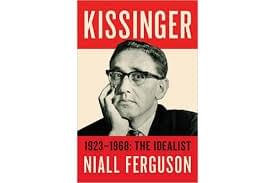
This clever bait-and-switch, either by the publisher or the author, is, however, explicitly confessed in the introduction itself – what Ferguson actually means to argue is that his subject is an idealist of the Kantian variety, not the more commonly understood Wilsonian mould.
What is a Kantian idealist? Fundamentally, this is an epistemological inquiry that lays out a framework of what one can and cannot know, and the relationship between the subject and the object of inquiry. In Kritik der reinen Vernunft, Immanuel Kant argued that the world appears to us as we see it without implying any sort of truth claim about objects in it as they truly are, or ding-an-sich as the German philosopher put it. Kant was certainly not the first to postulate this – strands of this kind of thinking goes back to the pre-Socratics and can also be found in Hindu and Buddhist philosophy.
How this affected Kissinger, which is what is important to our story, is in his rejection of materialist theories of capitalist – or socialist – superiority. For the young Kissinger, the Cold War was not a competition over who had more nuclear warheads, missiles, or submarines; those were, without doubt, the tools but the struggle was over something far greater – the idea of freedom. It was this positive message that would win the world over to the West better than any short-term inducement of economic or military aid, Kissinger believed.
There are two points of clarification here. The first is that Kantian or transcendental idealism can lead to empirical realism: though we may not know the true nature of objects, we may still know them as they appear to us.
This is not the beginning of some radical subjectivity as Kant argues that all rational beings share an objective knowledge of the rational world that is derived from logical inferences about basic categories. There is, to use Kant’s words, a transzendentale Einheit der Apperzeption, or a transcendental unity of apperception without which it would be difficult to postulate a categorical imperative.
Simply put, the young Kissinger could well have been a functional realist even as he was moved by Kantian idealism. This is the line between Kissinger the thinker and Kissinger the actor, a discontinuity that will only grow in the second volume of the biography as the German-Jewish émigré moves office into the most political square footage in the world.
The second point is that the overwhelming use of realism in opposition to (Wilsonian) idealism creates a situation ripe for misunderstanding, something the author himself teeters on at certain points in his tome.
Ferguson contrasts the high-minded Kissinger with the technocratic and pragmatic administrations of John F. Kennedy and Lyndon B. Johnson who sought to win the Cold War not by championing the West’s ethical values but by pushing the utilitarian benefits of modern American industrial modernity.
This mistakes the tools with which the Cold War was fought for the reasons it was fought; Kennedy and Johnson may not have had a greater moral mission – the Anglo Saxon fetish for empiricism ran particularly strong in that era – but this hypothesis is merely stated and not proven.
Ferguson has a nuanced treatment of idealism but he is less clear on what he means by realism. He mentions it only in passing, and that too in opposition to Wilsonian idealism. This is a facile treatment of realism, a school of thought that has become ever more refined since the end of the Second World War.
Despite its several offshoots – classical realism, liberal realism, neorealism, offensive realism, defensive realism, and more – its core assumptions remain the same: that states are the most important actors on the world stage, they are rational, unitary, competitive, and driven by self-interest. Raisons d’état may be pursued by a variety of means, not excluding propaganda and other means of what is today called soft power.
These non-military and non-economic methods of winning allies and influencing neutrals, in essence, propagate a moral framework which undergirds the greater struggle of the Cold War. Given the enormous efforts of the United States Information Agency in France, Italy, Scandinavia, India, and other countries, Ferguson’s binary of Kissinger as the moral Cold Warrior and the US leadership as amoral politicians is uncharitable.
Realism need not be amoral – the lack of faith in other people, to view one’s fellow man as moved – if not driven – by self-interest is not amoral. In other words, Ferguson might consider if it is perfectly possible for Kissinger to have moral considerations and yet be a realist.
Despite an interesting yet eventually unconvincing central theme, the beauty of The Idealist is in the vast amount of information it provides on its subject. Ferguson keeps his word – he promises a bildungsroman wie es eigentlich gewesen (as it actually was – Leopold von Ranke’s conception of how history should be written) at the outset and does not disappoint. In keeping with Ranke’s advice, Ferguson allows the data to speak for itself as much as possible without lending his own voice at every turn.
When writing a biography, it is important that the author not get too close to his subject; rather than judge, he must present the world the subject inhabited with all its choices and limitations. Ferguson does this admirably well – the wealth of archives, obscure collections of private papers, and interviews that went into producing this book – 111 archives worldwide and 37,645 pages of documents, we are told – itself makes it a worthwhile addition to one’s bookshelf.
Born Heinz Kissinger on 27 May, 1923, to an Orthodox Jewish schoolteacher in Fürth, a small town barely seven kilometres northwest of Nürnberg in the German province of Bavaria, the future American secretary of state was an average student who loved football.
Forced to flee Nazi Germany in 1938, the Kissingers were fortunate to have family already in the United States that was willing to sponsor them. Kissinger was barely 15, old enough to feel the persecution and hatred but not yet mature enough to understand why. In several interviews, the nonagenarian has rejected being a child of Weimar, downplaying the psychological impact of persecution and flight.
Kissinger returned to his hometown barely six years later in an American military uniform, and though the Kissinger clan had been culled by at least 30 members, he showed surprising equanimity, especially considering his age, and bore no ill will against the Germans. This is after his unit in the 84th Infantry Division had been part of the liberation of two satellite concentration camps of Neuengamme at Ahlem and Salzwedel and he understood full well just how his family might have perished. As he wrote to his father-
You, dear father, say: be tough to the Germans… I say be tough, yes. But show them also why you are tough. Prove to them that you are here in Germany because you are better, not that you are better because you are here. Be fair in your decision, be ruthless in your execution. Lose no opportunity to prove by word and deed the virility of our ideals.
Kissinger has never made much of his military service though records show that he earned a Bronze Star; after the war, he was put in charge of de-Nazification efforts in Krefeld owing to his fluent German and passable French.
Contrary to common belief, he did not reinstate former Nazis to their positions in the interest of efficient administration; in fact, it was US policy to gradually slow down and abandon de-Nazification. He was excellent at his job, earning promotions all the way to sergeant in the Counter Intelligence Corps before he returned to the United States.
One of the greatest influences on Kissinger in his formative years had been Fritz Krämer, the Mephistopheles to Kissinger’s Faust, as Ferguson describes. Krämer was also a German-Jewish refugee like Kissinger but 15 years his senior, and the two met at Camp Claiborne, Louisiana, where Kissinger had been stationed for training.
He met the second great influence in his graduate advisor, William Yandel Elliott III, at Harvard University, which Kissinger attended on the GI Bill and wrote that famed 388-page senior thesis that his undergraduate advisor, Carl Friedrich, refused to read past page 150.
Kissinger’s dissertation, published as A World Restored, has been misunderstood, Ferguson argues, as in praise of Prince Klemens Wenzel von Metternich when in fact the real hero of the work was British foreign secretary Robert Stewart, more popularly known as Lord Castlereagh. On this, Ferguson’s case is compelling and it is worth revisiting A World Restored.
The Idealist takes us through Kissinger’s career until 1968. His frustration at the difficulty in being heard in the corridors of power, his failure to secure a tenure-track position – the Holy Grail of academia – at Harvard, and the stupendous success of his book Nuclear Weapons and Foreign Policy in 1957 that at once made him a known figure.
In it, Kissinger proposed the radical idea that nuclear wars could be fought, that they could remain small and localised for surely the Soviets would have the sense to distinguish between a strike on an armoured division in an open field from the annihilation of Moscow.
In a world ensconced in MAD – Mutual Assured Destruction – Kissinger’s proposal was indeed radical. Nonetheless, MAD seemed a bluff to the young assistant professor from Harvard, and a particularly bad one at that. The biographer disagrees with the biographee on limited nuclear war and it is also clear that Kissinger was out of his depth then on nuclear strategy, considering a 500-kT nuclear device a small, tactical weapon!
Kissinger would advise the Kennedy and Johnson administrations but never get close to power himself. Partly, this was because he was seen as the Republican Nelson Rockefeller’s man, having supported his presidential bid in 1960, 1964, and 1968. It was also because the National Security Adviser and his one-time mentor from Harvard, McGeorge Bundy, repeatedly blocked him from access to the president.
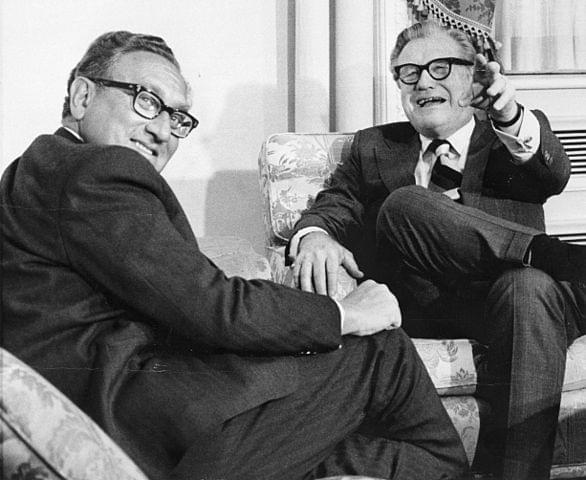
Kissinger’s perseverance is obvious, and he would remain close to government circles despite his unworthiness among “the best and the brightest.” Ferguson describes Kissinger’s positions on some of the key issues that occupied the United States in the 1960s – Berlin, the Multi Lateral Force, the Vietnam War, German reunification, Ostpolitik, China – all the while arguing for Kissinger’s idealism.
It is only with his experience in the negotiations on bringing peace to Indochina that realism first posed a serious challenge to Kissinger’s idealism, setting the stage for the sequel to The Idealist to be called, The Realist.
Ironic in hindsight, when news got out that Nixon had appointed Kissinger as his National Security Advisor despite the latter’s campaign on behalf of the former’s rival, there was general satisfaction that the right man had been chosen for the job. The American public would soon change its mind though his popularity – his high-flying social life and his dark humour – would keep them enchanted for at least another five years.
It is intriguing why Kissinger, were he so Machiavellian a realist, would back a losing horse thrice for the Republican nomination for president. Was he that clueless about American politics, or was it that he simply supported whom he believed to be the best man for the job? Although Ferguson holds this up as another indication of Kissinger’s idealism, the biography has no satisfying answer to offer either way.
Kissinger’s unyielding position on compromise over Berlin, in contrast with his willingness to abandon Vietnam, may also give an insight into the professor’s world view. Kissinger has always been the oddball in US politics, fitting in none of their four broad schools of thought – Hamiltonian, Jeffersonian, Jacksonian, or Wilsonian. At his core, despite the external trappings of an American education, Kissinger was still European.
His countenance of an independent European nuclear deterrent – anathema to the White House – and hostility to Ostpolitik also lends weight to this suspicion. In fact, it might even be worth exploring if Kissinger was not a European realist rather than a Kantian idealist. His ease in relating to Europe’s pre-eminent realpolitikers like Charles de Gaulle and Konrad Adenauer over the state of Berlin, the future of China, and nuclear strategy is worth noting. In a 1963 article in Foreign Affairs, the future secretary of state described their thinking as:
…their reality is their concept of the future or of the structure of the world they wish to bring about…
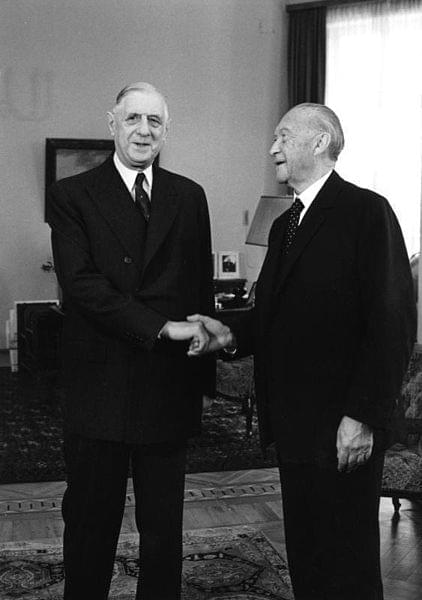
Some might fault Ferguson for not covering in greater detail some of the events of the Cold War that transpired between 1951 when Kissinger set up the Harvard International Seminar and 1968 when he accepted Richard Nixon’s offer to become the NSA. However, The Idealist is ultimately a biography of Henry Kissinger and not a textbook of Cold War history – at 1,008 pages, perhaps Ferguson can be let off the hook for not being sufficiently thorough.
There are a couple of other burrs – putting the blame on India’s Forward Policy for the Chinese invasion of 1962, for example, or holding North Vietnam solely responsible for the failure of talks in 1967/68 – that will irritate the specialist but as Ferguson confesses, he is no Cold War historian and it would be a particularly persnickety reviewer who holds that alone against a generally excellent work.
Ferguson’s cursory dismissal of most of Kissinger’s critics might also be found unconvincing. However, the author makes a powerful case that by the ethical standards even middle-of-the-road critics of Kissinger want to impose, several senior US officials who have served before and after Kissinger ought to be in the docks right alongside him. Yet it is only Kissinger who is at the brunt of all the ire.
Kissinger’s own point about blame is also interesting – historians study what happened but it is equally important to understand what did not happen or what could have happened to obtain a full picture of the choices and limitations of office bearers. Yet that which did not happen does not leave a trail as rich as that which did; in mining only the latter, scholars sometimes completely miss the zeitgeist.
This biography has evinced interest for one other reason: Kissinger sought out this author. Admittedly, the offer had first gone to another British historian, Andrew Roberts, but he turned it down for personal reasons and Ferguson was seduced by the promise of new documents – at least 145 boxes of them.
As is the question with any authorised biography, how independent was the author? And as is the answer each time, completely! In this case, it might even be true. Ferguson’s portrait of Kissinger in the first half of his life is neither flattering nor admiring; the subject was a man of substantial achievement and that would be hard to hide. Furthermore, it is equally dishonest to be harsher to your subject in the hope of appearing impartial before your peers and readers.
Kissinger has been called many things, even if we stick to the polite epithets. Jussi Hanhimäki called him a flawed architect in his 2004 publication, The Flawed Architect: Henry Kissinger and American Foreign Policy. It was soon after this that a friend of mine went to visit Kissinger and in the course of the conversation, the topic came to Hanhimäki’s work. “You know,” my friend said, “perhaps a more useful way to look at you is as a footballer.”
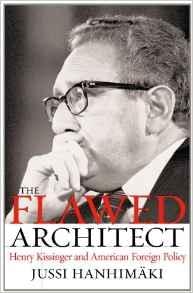
“How so?” Henry wanted to know.
“Well,” continued my friend, “in football, you have a clear goal…but the situation is very dynamic. And in heading towards that goal, you may pass, dribble, foul, get fouled, fall back, surge… But none of it changes the goal.”
In his deep German-accented voice, Henry said, “I like that.”
Jaideep A. Prabhu is a specialist in foreign and nuclear policy; he also pokes his nose in energy and defence related matters.





